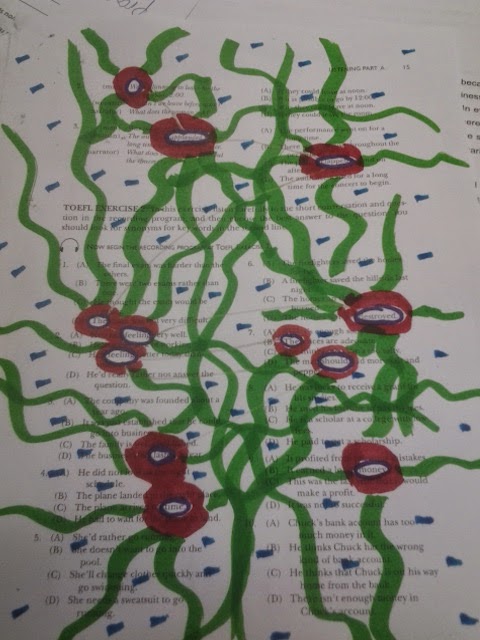There is an activity I like to give my fast finishers, though sometimes we do this as a class when working on poetry. When someone finished early I give them an old worksheet and have them make a story or a poem out of it.
If we are studying a particular grammar point I may ask them to include that, but normally I don't.
It is basically a fun and pretty way to have students write without writing.
Optional (Pre Step):
The first time you do these in class you may want to show some examples first. One famous "blackout poet" is Austin Kleon. He has a book Newspaper Blackout
 |
| Unused Worksheet |
Give them an old worksheet. In this case it is a TOEFL diagnostic test. My school often asks me to give these workshops, but since I never know how many students will attend I normally have extras.
Step 2.
Have students underline (in pencil) words that they know. The great thing about this task is even if they only understand 10% of the words that's fine! They don't need to understand everything.
Step 3.
See if they can create a poem or story with the words they know.
OPTIONS!
For punctuation practice I like to have them re-write their poems and punctuate them properly in the margin. Punctuation often adds extra meaning to their words.
As far as appearances, you have some choices:
 A. Students can black out the words they won't use. (or use any color they like!)
A. Students can black out the words they won't use. (or use any color they like!)You need fun questions.
How can rhyme help you?
When poems work well.
Pictures must use your friends in public.
You can create, copy, open, clip, web, graph.
B. Students can draw lines connecting the words and decorate the page as they like.
We applauded, clapped.
The feeling destroyed.
The feeling should last: money, time.
C. Students can create art over the words.
Essentially, she creates a blank slate by having students paint white over the words they will not use. Once dried they draw a picture that they feel connects to the story. I do not do this in my class as I don't normally have access to paints, water, etc. However, if you are in an art friendly environment, it could be something to consider.
There are tons of ways to reuse old worksheets, but this is another one to add to your list. Plus, it is fun!
What's your favorite way to reuse paper?


Quality! Love it :)
ReplyDeleteI am so glad you love it. Thanks for letting me know; it means a lot :)
DeleteI met Haryette Mullen, one of the greatest American poets who use this and other techniques, last year. She introduced me to the LANGUAGE poets. They call this technique "erasure", and use many others that can easily find their way into our classes. Have a look here: http://copof10.umwblogs.org/multimedia-rpt-list/language-poetry/
ReplyDeleteThanks for the link! I find a lot of the poetry mentioned there would be really difficult for some of some of my students who are still working on English (like Cybertext). I did however enjoy the "Language Poetry Experiments" most of which transition nicely into the classroom.
Delete